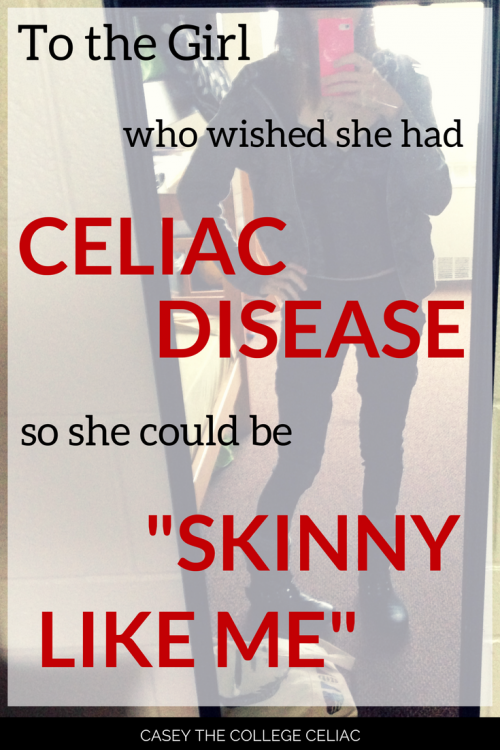To the Girl Who Wished She Had Celiac Disease to Be 'Skinny Like Me'
I met you my first week as a college freshman. You know what I thought first when I saw you? “Wow. She’s gorgeous.” Long, thick, blonde hair; clear skin; curves that were sure to catch even the upperclassmen’s attention. She was everything I wasn’t. She was, in some aspects, everything celiac disease had taken away.
You see, I’d only received my celiac disease diagnosis a few months before. Some girls get a surprise serenade from a cute boy asking them to prom; the week before my senior prom, I got a call from my doctor instead. In that afternoon phone call, a few simple words changed my life: “celiac disease” and then “gluten-free diet.” I spent the summer before my freshman year of college shopping for notebooks and dorm furniture and a new backpack – but also learning how to eat a diet I’d never even heard of weeks before.
In fact, the day before I moved into my college dorm, I underwent my second endoscopy and my first colonoscopy. I wasn’t healing normally on a gluten-free diet, and my doctors needed to find out why. Honestly, I didn’t even have time to get nervous about how my college roommate would handle my “special requests” (a.k.a. my own mini fridge, my own microwave and half of the room, all covered in “gluten-free” sticky notes). There’s only so much you can think about when you’re trying to keep it together while eating nothing but chicken stock, jello and the special “colonoscopy prep” cocktail.
I don’t say all of this to make you feel bad for me or to get pity. I just want to help explain why I didn’t expect any college student to want to be me. At that point, I was 100 percent gluten-free but still struggling to heal…which meant my weight was really low. While my fellow freshman hallmates devoured pizza and hamburgers and whatever meals happened to catch their eye in our college cafeteria, I scoured the salad bar and the small “gluten-free” section, trying to find something safe and filling. I ate a lot of salads.
I had a mouthful of lettuce when you made this comment – a comment that occurred four years ago but still sticks out in my mind. We were sitting together in the cafeteria, along with all the other girls from our hall. It’s a typical freshman strategy: safety in numbers, we think. And, apparently, you care about numbers.
How do I know? Because, even as you bit into that slice of pizza (pepperoni with extra cheese, which reminded me of the Papa John’s pizza my family would order some Sunday nights), you said it: “I wish I could have celiac disease so I could be skinny like you.”
At the time, I laughed it off. I chuckled, stabbed at another piece of wilted lettuce and said, “Well, I’d trade you 10 pounds for a slice of that pizza.”
Now, though, I’m done laughing. I know you didn’t mean any harm. You were – maybe still are – just a victim of the societal beauty standards that proclaim skinny is best. However, I’m now four years older, stronger and more experienced. And this is what I wish I had said to you – and what I wish everyone would know about celiac disease.
I wish I had told you that not everyone with celiac disease is skinny. In fact, “celiac disease weight gain” is a popular Google search because it does happen relatively often. Some people diagnosed with celiac disease are overweight. Celiacs can also gain weight on the gluten-free diet, either because their body is finally absorbing nutrients or because they load up on gluten-free alternatives to old foods. So don’t assume that celiac disease will lead to weight loss – or that you must experience weight loss to receive a celiac disease diagnosis.
I wish I had told you that celiac disease is so much more than an “excuse” to eat healthy. Celiac disease is a chronic autoimmune disorder. Undiagnosed, celiac disease can cause infertility or miscarriages, cancer, other autoimmune disorders and more. And eating a celiac disease diet is much more complicated than just going gluten-free. Let’s use an analogy from a recent edition of Gluten Free Nation magazine. Imagine cutting up one piece of bread into 7,300 pieces. Just one of those tiny pieces can sicken and cause dangerous intestinal damage in celiacs like me.
I wish I had told you that, as sick as I was at the time from celiac disease complications, your mindset was even sicker. It’s sad – scary, even – that girls like you are often tricked into valuing appearance over health. There is nothing glamorous about weighing so little at 18 years old and having to be hospitalized and fed through a feeding tube for two weeks. Who cares if you’re “skinny” if you can’t live fully enough – or, even more seriously, long enough – to enjoy it?
I’m sure a lot has changed in the four years since these words escaped your lips. We’ve both graduated college, and you’re probably experiencing your share of life milestones, as am I. All I have left to do is to share a few hopes. I hope you learned more about celiac disease from the time you spent at college with me. I hope you love your curves and your thick hair and all of the other physical signs that your body is healthy and thriving.
And I hope you never again wish to have celiac disease so you can be skinny. First, because one doesn’t necessarily lead to the other. And second? Because I’ve learned how good it feels to be healthy…and I want every other person to have the chance to strive for – and savor – that same feeling.
This post originally appeared on Casey the College Celiac.
We want to hear your story. Become a Mighty contributor here.



